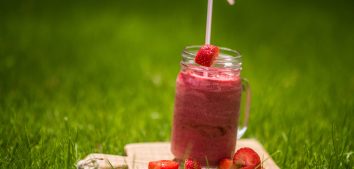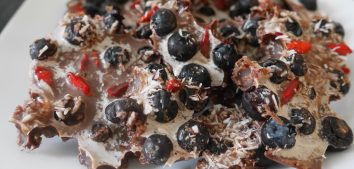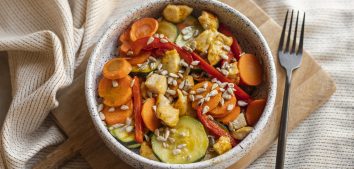
What to Eat Before a Workout?
You know that I believe that our life force comes from good food. And when you combine it with physical activity, the results is a recipe for health. You have asked me many times how to compose your meals both before and after exercise. Let me now elaborate on the topic of pre-workout meals. Are you ready?
There is no template for a perfect pre-workout meal. There are lots of things that affect what is good, what you need to eat and what products you should skip before physical effort. The time before your workout will have a huge impact on the size, type and composition of the meal.
The meal 3-4 hours before training
You can eat a full-fledged meal about 3-4 hours before training. Then your body will have enough time to digest and absorb it. It will help you replenish glycogen and protein reserves that, while circulating in the blood, counteract muscle catabolism (breakdown) and support subsequent recovery after your workout.
So what are the things that you can eat?
- strawberry rice pudding (HERE ), porridge, or a banana omelet are good ideas for breakfast,
- some classics for lunch: pasta with chicken bolognese (HERE) or groats with vegetables and steamed fish,
- for dinner you can have sweet potato dumplings, eat a tortilla with tuna and vegetables or millet porridge with turmeric and fruit.
The principle you have to follow with this type of meal is to provide all the ingredients necessary for the body: carbohydrates, proteins, and healthy fats.
2 hours before your workout
You couldn’t have a balanced meal earlier. Then what? You should focus on easily digestible dishes, no experimenting with new ingredients. None of you would probably feel comfortable exercising with a full stomach. During strength training, this may not be as significant a problem as in the case of endurance training (running) or strength-endurance training (fitness classes, team sports). Therefore, a meal should consist of easily digestible carbohydrates and proteins, and limited amounts of fats and fiber.
My meal suggestions are:
- a bit smaller portion of porridge with fruit ( HERE),
- smoothie based on: protein, milk, fruit and oat flakes,
- sandwiches with ham / lean fish and vegetables,
- yogurt with home-made granola and fruits.
Early morning workout
You also ask what to do if you can only train in the morning, about an hour after waking up? To eat or not eat? Things get a little more complicated here, but there are some solutions. A usual breakfast or a candy bar may not be a good solution because during exercise, the body tries to focus on muscle work, and if some food remains in the digestive tract, the training will become ineffective. You might experience gastrointestinal discomfort.
That is why I would simply recommend:
- a banana,
- a handful of dates,
- a protein shake (e.g. Foods by Ann vegan protein blen-HERE) with a banana,
- isotonic sports drinks or energy gels are popular with athletes.
Some people tend to have dinner rich in carbohydrates before the morning workout the next day. To a large extent, it depends on your body what you can have in a meal before training and how short before the workout you can eat it.
Dinner should provide carbohydrates with a low glycemic index, full-fledged protein and a small amount of healthy fats, similar to a meal that is recommended 3-4 hours before exercise. A very good solution will be various types of salads based on groats with the addition of vegetables and lean meat, fish or tofu.
Regardless of the type and time of your workout, REMEMBER that a meal is an essential fuel for YOUR muscles and brain. Even if the goal of exercise is to reduce weight! Studies show that for people who are trying to reduce fat, eating a meal which contains carbohydrates translates into increased oxygen consumption (utilization), and thus, spending more calories within a day after training.
You can find lots of inspiration for pre-and post-workout meals on my blog. If you would like to learn more about it, I am waiting for your suggestions and questions in the comments.
Bibliography:
- Burke L.M., et. al. Effect of coingestion of fat and protein with carbohydrate feedings on muscle glycogen storage. J Appl Physiol. 1995 Jun;78(6):2187-92
- Jäger et al. International Society of Sports Nutrition Position Stand: protein and exercise. Journal of the International Society of Sports Nutrition (2017);
- Kerksick et al. International society of sports nutrition position stand: nutrient timing. Journal of the International Society of Sports Nutrition (2017);










Comments No Comments
Join the discussion…